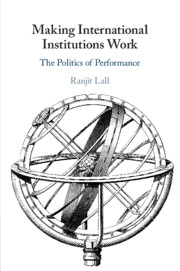Book contents
- Frontmatter
- Dedication
- Contents
- Figures
- Tables
- Acknowledgments
- 1 International Institutions and the Performance Puzzle
- 2 A Theory of Institutional Performance
- 3 Learning from Assessment
- 4 Performing for Scraps
- 5 The Performance of Life
- 6 Effective but Unaccountable?
- 7 The Politics of Performance
- Appendix A Formalizing the Argument
- Appendix B Empirical Details
- Appendix C Interview Methods and List
- Appendix D Survey of International Bureaucrats
- Bibliography
- Index
3 - Learning from Assessment
Quantitative Tests on 54 Institutions
Published online by Cambridge University Press: 16 February 2023
- Frontmatter
- Dedication
- Contents
- Figures
- Tables
- Acknowledgments
- 1 International Institutions and the Performance Puzzle
- 2 A Theory of Institutional Performance
- 3 Learning from Assessment
- 4 Performing for Scraps
- 5 The Performance of Life
- 6 Effective but Unaccountable?
- 7 The Politics of Performance
- Appendix A Formalizing the Argument
- Appendix B Empirical Details
- Appendix C Interview Methods and List
- Appendix D Survey of International Bureaucrats
- Bibliography
- Index
Summary
Chapter 3 subjects the theory’s macro-level hypotheses to statistical tests based on a comprehensive new dataset: the Performance of International Institutions Project (PIIP). It begins by describing the PIIP’s scope, contents, and sources. The empirical analysis is divided into four sections. The first examines the relationship between performance and policy autonomy. I find a positive association when policy autonomy is measured using a survey of international bureaucrats, a proxy for de facto policy autonomy, but no relationship when it is measured using formal rules, a proxy for de jure policy autonomy. The second section turns to the determinants of de facto policy autonomy, showing that the survey-based measure is positively predicted both by the quantity, depth, and breadth of operational alliances and by the exercise of governance tasks with high monitoring costs for states. In the third section, I employ a simultaneous equations strategy to isolate the effect of performance and de facto policy autonomy on one another. The fourth section summarizes a battery of robustness checks.
Keywords
- Type
- Chapter
- Information
- Making International Institutions WorkThe Politics of Performance, pp. 60 - 98Publisher: Cambridge University PressPrint publication year: 2023



